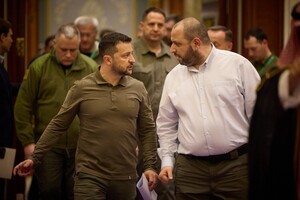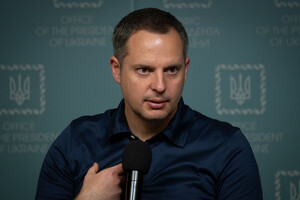Bureaucrats ask for money for their salaries under the guise of "defense expenditures"
Some departments have included their salary preferences in the changes related to the defense sector to the state budget. It seems that the short-lived times of rational state finances are over.
The government is once again preparing changes to the state budget this year – for the sake of "financial support for the security and defense sector," it is proposed to increase budget expenditures by more than three hundred billion. Of course, war requires money, and it is definitely not about saving money. Another thing is unclear: why, in addition to the Ministry of Defense of Ukraine, the Main Directorate of Intelligence of the Ministry of Defence of Ukraine (HUR MO) or the Foreign Intelligence Service of Ukraine (SZRU) completely civilian departments also want an increase in spending, and not all of them have a lack of funds at all. It is also unclear why the government of warring Ukraine approves of this approach, does not call on bureaucrats to economize, does not notice other resources for financing, or at least does not demand banal efficiency from administrators.
Government officials, I understand that you think that it is possible to spend public money on a large scale, because it is not your personal funds. But this is far from the case, we are spending money on debt, which will have to be returned, of course, to another government. But you're all government officials, aren't you?
Briefly about the changes
Shmyhal and his team consider the presented project of changes to be balanced, and even here one wants to cry: revenues have been increased by UAH 26 billion (of which 6 billion is the EU budget support), expenses are proposed to be increased by UAH 328.5 billion. Where is the balance? After all, it is in the presence of debts. Internal loans should increase by UAH 184 billion, external loans by UAH 107 billion. Another UAH 11.4 billion was accumulated by "saving". Real savings there are actually about 700 million hryvnias, the rest is a purely technical reduction in servicing the state debt. Well, whoever can, saves.
Yes, the lion's share of additional expenses is fully justified by the reality in which we live. First of all, we are talking about:
- UAH 211 billion for the Ministry of Defense of Ukraine;
- UAH 79.2 billion for the Ministry of Internal Affairs of Ukraine;
- UAH 4.2 billion for the Security Service of Ukraine (SBU);
- UAH 2.5 billion for the Main Directorate of Intelligence of the Ministry of Defence of Ukraine (HUR MO);
- UAH 0.6 billion for the State Special Communications Service of Ukraine;
- UAH 0.5 billion for the Foreign Intelligence Service of Ukraine (SZRU);
- UAH 0.2 billion for the Administration of State Guard of Ukraine.
However, there are proposals in the submitted project that are very reminiscent of the good old pre-war times, when state budget expenditures included subsidies for mines and agricultural holdings, presidential funds and funds for ambulances for Liashko. These proposals reminded me of the good old pre-war times, not in their scale - the times are not the same now, but in their approach.
Detailed information on salaries
It turns out that state bodies are badly short of money for salaries, and they found this out for some reason only in September.
In fact, there are few such cases as in the Bureau of Economic Security of Ukraine (BEB), where "powerful analysts" really failed to plan their own annual budget and were forced to transfer staff to a four-hour working day.
Usually, state bodies, on the contrary, establish salary needs with a possible margin. This is a simple exercise, it is enough to submit to the Ministry of Finance of Ukraine not the actual number of employees, but limited by the limit of their activity (that's right, suddenly someone will fill vacant vacancies within the year). Everything that can be "saved" during the year (because vacancies remain vacant) is given to the best of the best employees, mostly managers, in the form of Christmas tree bonuses.
It is unlikely that Mr. Shmyhal does not know about this in three years of his government career, but why not impersonate and deceive his colleagues. As if we have what, a war?
Therefore, the salaries of the Ministry of Foreign Affairs of Ukraine, the Ministry of Agriculture of Ukraine, the Secretariat of Cabinet of Ministers of Ukraine, the Ministry of Finance of Ukraine and their subordinates in the State Treasury Service of Ukraine and the State Audit Service of Ukraine (SAS) are not enough. The State Property Fund of Ukraine does not need salaries, but rather compensations for those dismissed from regional offices. In total, a billion and pennies are collected. On the scale of our current budget indicators, this is a very small amount, but in our country there are definitely suitable areas where to spend this billion.
We also have an explanation why it should not be spent on these whims of the departments.
FiscalCenter makes a monthly forecast of the needs of the public sector based on the main component – salaries. Their dashboard, in fact, shows the efficiency of using budget funds for salaries. The data provide a clear understanding of how much money the departments spend on salaries on average per month, and how much of the funds allocated by the state budget they do NOT spend on this item.
The most telling example is the Bureau of Economic Security of Ukraine (BEB) (who would doubt). Their average monthly labor costs amount to about 32.5 million hryvnias, and despite the reduced working week and terrible underfunding, they managed not to use about two million hryvnias for salaries. It is necessary to put something aside for the premium. At the same time, they are asking for an additional 315 million hryvnias from the state budget by the end of the year. This is already interesting, because they are actually asking for three months of the year, and the amount is for nine and a half. It is clear that the working week of the Bureau of Economic Security of Ukraine (BEB) should be increased to the standard in our country, and the number of employees may increase, but it is unlikely that this number will increase at least twice as early as October.
The Ministry of Finance of Ukraine is not asking much for itself (only UAH 37 million), but a lot for the State Treasury Service of Ukraine (+185.4 million) and the State Audit Service of Ukraine (SAS) (+51.7 million), while the Ministry of Finance of Ukraine itself has unused salary funds as much as UAH 252 million. These funds are almost enough to finance all three positions, and additional expenses should be ten times smaller.
But the winner of the anti-rating, in our opinion, is the Ministry of Agriculture. They actually want an insignificant amount of money, some 15.5 million hryvnias, but at the same time they have unused 155 million – ten times more. If you write off funds for something, then it is not counted as a loss. So why not try it.
This is not an exhaustive list of irrationality, but it is enough for understanding.
So, it turns out that it is not that there is nowhere to take the money, other managers also have extra millions: the representatives of the Prosecutor General's Office, for example, could borrow about 850 million UAH from unused funds, the Ministry of Health of Ukraine –almost 229 million, the State Judicial Administration – 112 million, Ministry of Environment of Ukraine – 89 million, Ministry of Justice of Ukraine – 70 million UAH. In total, this unused, but already allocated money is currently about UAH 2.3 billion. So, if you take a little money from the budget of each institution, then you can collect a good amount of money.
Actually, all this monitoring does not say – it screams that it would be possible to find the necessary funds, not by increasing, but by redistributing the available resources. But the government is sure that those who are engaged in excessive spending of funds while spending at the same time are not spending their own money. And they don't really do such analyses, what's the point in them, especially now?
Something to the point
At first glance, the story is as simple as possible: the amendments were made with the expectation that the changes for the defense sector will definitely be adopted, and along with tens of billions, their millions will simply be lost in the mass of numbers.
First, however, this is probably the first attempt at such audacious manipulation since the beginning of the full-scale invasion, which suggests that practices are changing. The shock caused by the hitherto unprecedented budget deficit has passed. Confidence that we will be supported with money under any conditions, on the contrary, has disappeared. And with it, the pre-war attitude towards the state budget as a cornucopia returned. So, next time they will ask for more and for lesser purposes, but again in the guise of "defense expenditures".
Secondly, after the analysis of available and desired expenses, many questions arise both for specific state bodies and for the government in general regarding the efficiency of work and control over this efficiency. If the funds not used by other departments could cover the additional needs of the Main Directorate of Intelligence of the Ministry of Defence of Ukraine (HUR MO) at the moment, it is probably worth it. And these are only those "savings" that lie literally on the surface. The government definitely has more data, people, and time for much broader optimization.
But it doesn't do anything and, obviously, it won't.
Read this article in Ukrainian and russian.
Please select it with the mouse and press Ctrl+Enter or Submit a bug
















 Login with Google
Login with Google